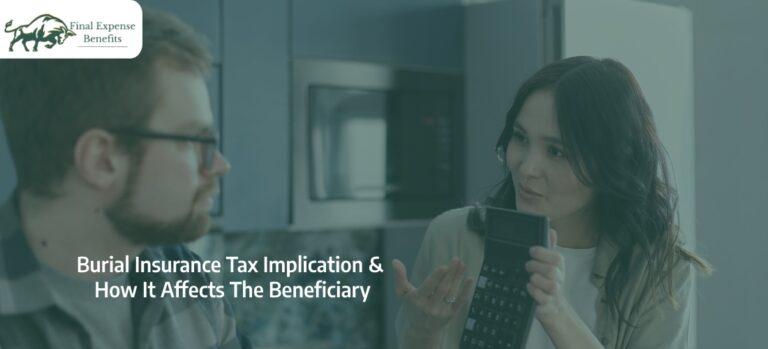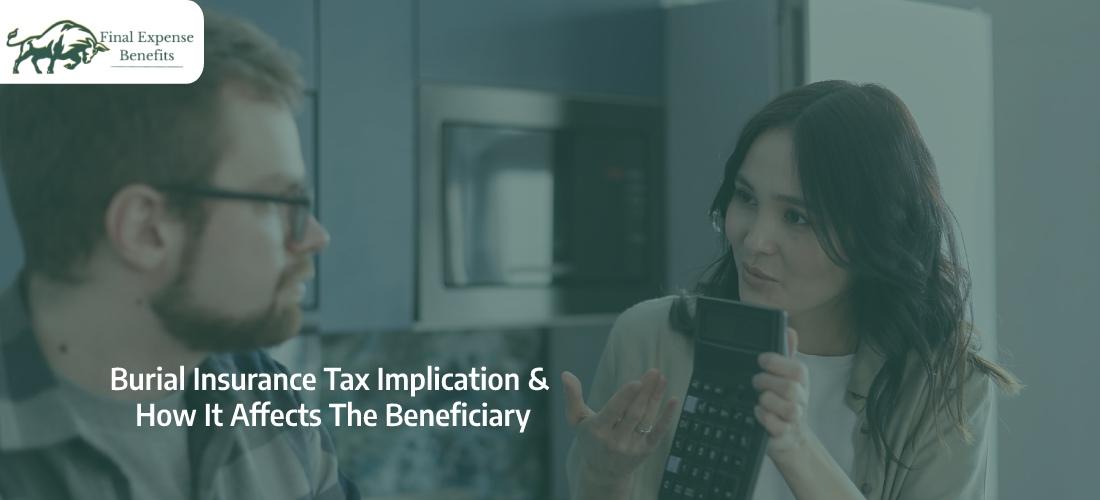Burial Insurance Tax Implication & How It Affects The Beneficiary
Easy Navigation

A burial insurance policy is an insurance policy that pays out a death benefit to cover the costs of a funeral or burial. The death benefit is typically paid to the named beneficiary of the policy. And one can use the death benefit to cover any funeral-related expenses.
While a burial insurance policy can be a helpful way to cover the costs of a funeral, it’s essential to be aware of the tax implications of this type of insurance. In general, the death benefit from a funeral insurance policy is taxable. There are a few exceptions to this rule, though.
If you’re considering purchasing a burial insurance policy, you must know the tax implications and how they can affect your beneficiaries. Keep reading to learn more!
But before that, let’s understand what it means to be exempt from taxes.
What does "tax-deductible" or "exempt from taxes" mean?

In the United States, the term “tax-deductible” or “exempt from taxes” refers to an expenditure that can be deducted from an individual’s taxable income. That means that the individual can subtract the amount of the expenditure from their total income when calculating their taxes. The purpose of this is to reduce the amount of taxes that the individual owes.
Many different expenses can be deducted, including charitable donations, business payments, and medical expenses. However, not all expenditures are tax deductible. So it is vital to consult with a tax advisor to determine which expenses can be deducted from your taxes.
How can burial insurance affect your tax liability?
As the burial insurance policy owner, you must know the tax implications of the death benefit payout.
Here’s what you need to know:
- There are a few things to keep in mind when it comes to the burial insurance tax implication.
- First, burial insurance is not subject to probate. That means your beneficiaries will not have to pay any taxes on the policy.
- Second, the death benefit from a burial insurance policy is also tax-free.
- Lastly, if you are the owner of a burial insurance policy, you may be able to deduct the premiums from your taxes.
But one thing to understand is that burial insurance can affect your tax liability. The death benefit from a policy is generally not taxable, but if the insurance is part of an estate, it may be subject to estate taxes.
Similarly, when you purchase funeral insurance, the cash value of the policy is paid tax-free to your beneficiaries. However, if you withdraw money from the policy or borrow against it, the money you receive will be subject to income tax.
Burial Insurance Meant For Funeral
Also, burial insurance is meant to pay for your final expenses. But when the death benefit of a final expense policy is used for funeral expenses, they are then taxable. That is because funeral expenses are personal expenses and cannot be deducted from individual tax returns.
However, if the estate’s finances were used to pay for burial and funeral expenditures, executors may be able to deduct some costs from the estate. With that, they can bring it down to the predetermined threshold that is tax-exempt.
Furthermore, the tax implications of burial insurance may differ depending on the state in which the policy was purchased. In some states, the death benefit is exempt from taxation, while in others, the beneficiaries may be subject to taxation.
It’s crucial to speak with a tax advisor like Final Expense Benefits. That will help you determine the specific tax implications of your burial insurance policy.
How can burial insurance affect your beneficiaries?
When people think about burial insurance, they often only consider the death benefit. However, there are other important factors to consider, such as the tax implications for your beneficiaries.
If you have burial insurance, the death benefit is generally paid out tax-free to your beneficiaries. However, the proceeds from the policy sale may be subject to income taxes. That is something that you should discuss with your beneficiaries. Doing so will help them be aware of the potential tax implications.
In addition, if your beneficiaries use the death benefit to pay for your funeral expenses, the money they spend on the funeral may be subject to estate taxes. That is another important consideration that you should discuss with your beneficiaries.
All of the above may have an impact on the beneficiaries of the burial insurance. But additionally, when a person dies, their estate is responsible for any unpaid taxes. If the deceased had a burial insurance policy, the beneficiary could use the death benefit payout to cover these taxes. However, if the death benefit payout is insufficient to cover the taxes owed, the remaining balance will pass on to the beneficiaries.
The burial insurance tax implication can be complex. However, with an understanding of the potential implications, you can help your beneficiaries make the best decision for their individual situation.
Conclusion
While burial insurance can have some tax implications, it can also be a great way to provide for your beneficiaries. By selecting the best burial insurance policy for your needs, you can ensure that your loved ones are taken care of after you’re gone.